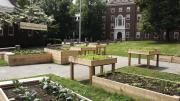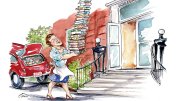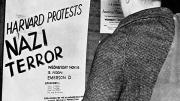Admiral Isoroku Yamamoto, who led the Japanese attack on Pearl Harbor in December 1941, was a special student at Harvard from 1919 to 1921. Seymour Morris Jr. ’68, M.B.A. ’72, of New York City, advances a theory that lessons Yamamoto learned at the University emboldened him to launch the attack, and that if the United States military had known their enemy as well as he knew them, they might not have been caught flatfooted, betting that he would first attack the Philippines.
In American History Revised: 200 Startling Facts That Never Made It Into the Textbooks (Broadway Books), Morris argues that if Washington had done some serious background checking into Yamamoto’s student days, they would have uncovered useful clues to his psychological makeup. “Classmates would have remembered Yamamoto well: a hard worker but not a grind, exceptionally curious and imaginative,” Morris writes. “When they introduced him to the game of poker, he became a fanatical poker player who would stay up all night, winning hand after hand. And what did he do with his poker winnings--lead the good life? No, not at all: he hitchhiked around the country during the summer, exploring America.” Years later, as a naval attaché at the Japanese embassy in Washington, D.C., and still a compulsive poker player, Yamamoto gambled with members of the United States military. “Spurred on by his victories,” Morris writes, “he developed contempt for the mental agility of his American naval opponents at the poker table.”
Yamamoto strongly opposed Japan’s entry into the war; he feared American might. But when ordered, he would do his best. As commander of the Combined Fleet, he calculated that to beat the United States, it was necessary to strike first. “Yamamoto wasn’t a great poker player for nothing,” writes Morris. He resolved, as in poker, to “blow the best player out of the game, good and early....The shame of the Joint Chiefs was their lack of imagination in trying to figure out their opponent. They thought of him as a traditional Japanese who would do everything ‘by the book’ (just as they did). They failed to consider that maybe, just maybe, Isoroku Yamamoto was more American than they were.”
***
Green surprises. Gardens can surprise: often agreeably, as when a puckered, rock-hard seed generates a nasturtium; sometimes otherwise, as when hornworms appear among the tomatoes. To city-dwellers used to getting their vegetables at the supermarket, time spent in a garden can teach many lessons, among them that that unknown bunch of foliage over there has a radish at its root.
The new Harvard Community Garden (below) was built this spring in raised beds of different heights in a 560-square-foot growing space between the front door of Lowell House and Mount Auburn Street. Its mission is “to provide experiential education in sustainable, urban agriculture, and to provide food for students, faculty, and the local community.” It was planted--with arugula, mizuna, Swiss chard, Toscano kale, onions, snow peas, peppers, eggplant, and much more--and will be maintained by undergraduates, with advice from various quarters, including the Center for Health and the Global Environment at the Medical School.
Coming along are Sun Gold tomatoes, “my favorite cherry tomato,” says Louisa C. Denison ’11, of Dudley House and Cambridge, one of the prime movers of the project. “We are excited,” she adds, “to be the first generation of Harvard students to grow food on campus.










